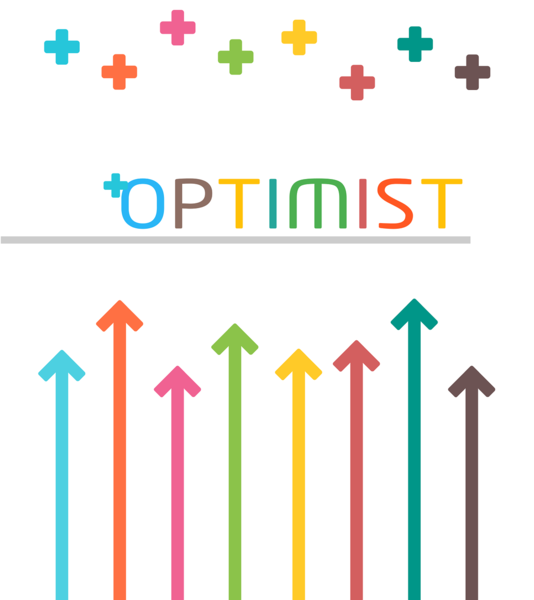Our brain rewards us for being optimistic by producing something called "Dopamine," which allows us to feel pleasure, satisfaction, and motivation. When you feel good that you have achieved something, it's because you have a surge of dopamine in your brain. An article in Forbes Magazine titled "Brain Science Reveals the Striking Power of Optimism" tells us researchers have discovered that optimism can protect against depression and make people more resistant to stress. Optimism may even help us live longer because, according to the research, optimistic people are better at fighting illnesses.
What is an optimist? Focusing on optimism helps reflect on the positive aspects of life rather than the negative ones. Optimism is all about how we perceive things. It turns out that an optimistic attitude helps us be happier, more successful, and healthier. A recent article on verywellmind.com describes optimism "as a mental attitude characterized by hope and confidence in success and a positive future." Optimists tend to view hardships as learning experiences or temporary setbacks. Even the most miserable day promises them that "tomorrow will probably be better."
Optimism builds resilience. It strengthens us to try again rather than give up. It allows us to keep our goals and dreams in play and to act on the motivation to keep working toward them. Because of this, optimistic people feel more in control of their situations and have higher self-esteem.
What is an optimist? Focusing on optimism helps reflect on the positive aspects of life rather than the negative ones. Optimism is all about how we perceive things. It turns out that an optimistic attitude helps us be happier, more successful, and healthier. A recent article on verywellmind.com describes optimism "as a mental attitude characterized by hope and confidence in success and a positive future." Optimists tend to view hardships as learning experiences or temporary setbacks. Even the most miserable day promises them that "tomorrow will probably be better."
Optimism builds resilience. It strengthens us to try again rather than give up. It allows us to keep our goals and dreams in play and to act on the motivation to keep working toward them. Because of this, optimistic people feel more in control of their situations and have higher self-esteem.

Optimistic people live longer, have stronger immune systems, and have lower stress and pain levels. One large study published in 2018 determined that optimists have a life span of 11% to 15% longer than average and are more likely to live to age 85 or older.
Optimism isn't about ignoring the bad stuff (that's denial). Optimism defines how we interpret and think about ourselves and our world. Childhood experiences influence our levels of Optimism and pessimism. This may include the family's emotional or financial stability. People from challenging backgrounds develop negative self-talk, often leading to a pessimistic mindset.
What can we do to become more optimistic?
Optimism isn't about ignoring the bad stuff (that's denial). Optimism defines how we interpret and think about ourselves and our world. Childhood experiences influence our levels of Optimism and pessimism. This may include the family's emotional or financial stability. People from challenging backgrounds develop negative self-talk, often leading to a pessimistic mindset.
What can we do to become more optimistic?
- Engage and interact with others-seek social connections. A recent article in Psychology Today reminds us that "Humans are social creatures, and therefore it seems intuitive that talking to other people should increase our feelings of happiness and social connectedness."
- Practice gratitude. Set aside each day to reflect on what you are grateful for and write it down. Research shows that people who practice gratitude and write it down have a more positive outlook on life. If you don't want to keep a written journal, write a short statement on your daily calendar.
- Compliment yourself. Identify the obstacles you have already overcome and allow yourself to feel success or happiness. In other words, pat yourself on the back for all your life and daily successes!
- Move. Exercise increases feel-good endorphins, and research has shown that movement has multiple health benefits. Research has also shown us that exercise increases serotonin production and suppresses stress hormones, directly affecting our ability to practice Optimism. Join a fitness class or "move naturally" (walking, working in a garden, or helping someone with a chore.)
- Get more and better sleep.
- Eat the rainbow. Add a colorful collection of fruits and vegetables to every meal.



